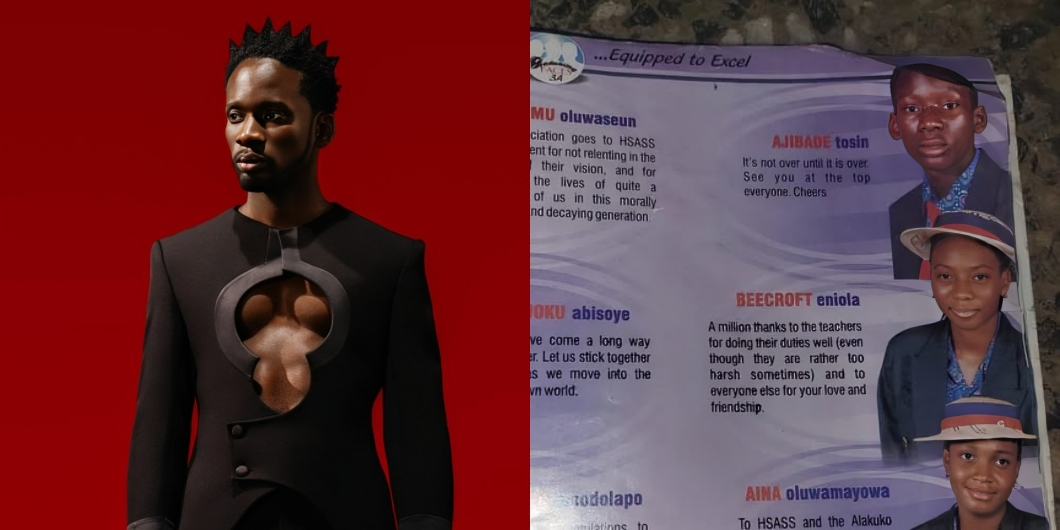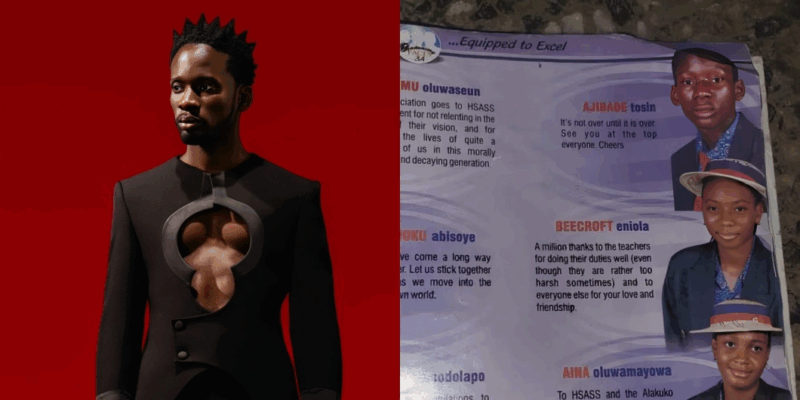
Social media went abuzz over the weekend after the billionaire Nigerian music artist, Oluwatosin Ajibade, popularly called Mr. Eazi shared a photo of his secondary school yearbook on his X account. The harmless post caused quite a stir, with timelines flooded with a deluge of heated conversations, banter, and even debates about success, personal growth, and the power of throwback culture.
The viral post, which showed Mr. Eazi’s teenage look alongside those of his two classmates, drew reactions from fans and critics. The photo left some netizens astonished at how far he has come. In contrast, others embarked on an ultimate search for the singer’s schoolmates through their LinkedIn profiles to draw comparisons about their career progression.
Why throwbacks hit hard online
In Nigeria’s fast-paced social media culture, throwback content, most times tagged #ThursdayThrowback, has proven to be one of the most reliable forms of content to make the trending list. Whether it’s old photos of celebrities, nostalgic adverts, or childhood memories, throwbacks connect with audiences because;
Throwback content portrays public figures as humans, away from the spotlight, demonstrating that everyone has a starting point, exemplified by the ‘grass to grace’ pattern. It also evokes a nostalgic feeling in people, reminding them of their own school days and teenage struggles. Most interestingly, it sparks debates and conversations about transformation, success, and the unpredictable nature of life, all of which Mr. Eazi’s yearbook photo portrayed
From Classroom to Global Stage
Mr Eazi went from being a Nigerian secondary school student to becoming a global musician, songwriter, and excelling as an entrepreneur in technology, real estate, African creative arts and sports business.
His yearbook photo has now become a reminder of his journey, one that blends talent, persistence, and vision. For fans, seeing him in his school uniform is a reflection of how ordinary beginnings can lead to extraordinary outcomes.
Social Media Buzz
Here are some reactions from online users in X (formerly Twitter):
Row_Haastrup wrote: “How many of you went to LinkedIn to check Beecroft Eniola?”
How many of you went to LinkedIn to check Beecroft Eniola? 😂 https://t.co/PJHz0Un5ge
— DON “Tobechukwu” Ade 👑 (@Row_Haastrup) September 21, 2025
Taiwo_junzi wrote: Nigerians are a strange breed.
Why in the world are you searching for Eniola and Mayowa just to measure them against Eazi, who today can boast of generational wealth?
Ask yourself where exactly were your own parents when Dangote, Mike Adenuga, Tony Elumelu, Emeka Offor, and Otedola were stacking billions?
Life deals everyone a different path, and most people will not turn out like the best amongst us, and that’s fine too. It doesn’t make them less deserving of basic courtesy or honour.
Instead of obsessing over needless comparisons, your concern should be focusing on your own path. Fix up!!!!”
Nigerians are a strange breed.
Why in the world are you searching for Eniola and Mayowa just to measure them against Eazi, who today can boast of generational wealth?
Ask yourself where exactly were your own parents when Dangote, Mike Adenuga, Tony Elumelu, Emeka Offor, and… https://t.co/hFDqK6JnBF— Taiwo_junzi (@Taiwo_junzi) September 21, 2025
gmltony said: If Mr Eazi na thief or no make am, nobody go come out claim say dem attend same school with am.
Takeaway Lessons
Beyond the laughs, shades and banter, Mr Eazi’s yearbook trend unveils the more profound lesson behind throwbacks: success stories are best appreciated when you see the starting point of the person in focus.
It also reflects Nigerians’ growing culture of preserving old photos, past music, and movies. These timeless pieces are finding their new life online.
The husband of the billionaire’s daughter’s old yearbook photo is more than just another viral moment. It is a reminder that in a world where people only showcase the “finished and perfect product,” throwbacks offer relatability, connectivity and a touch of nostalgia.
For many Nigerians scrolling through timelines, it’s not just about Mr Eazi’s school photo, it’s about remembering their own journey and asking: “How far have I come since then?”








